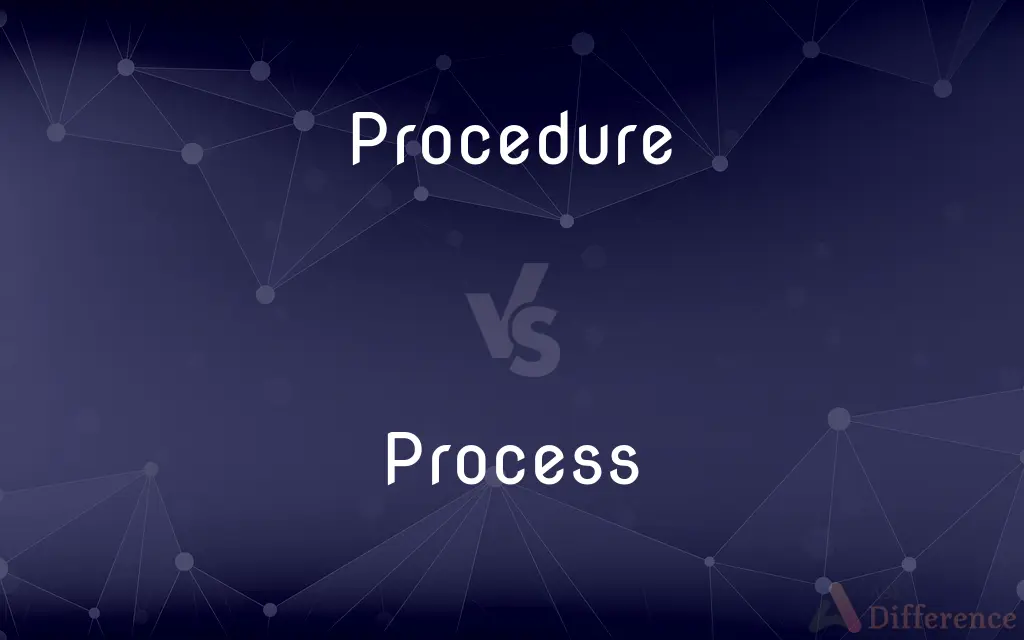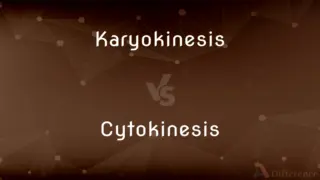Procedure vs. Process — What's the Difference?
Edited by Tayyaba Rehman — By Urooj Arif — Updated on April 26, 2024
A procedure is a set of specific steps taken to accomplish a task, emphasizing the method and sequence, while a process is a broader sequence of events or actions with a focus on the overall flow and outcomes.

Difference Between Procedure and Process
Table of Contents
ADVERTISEMENT
Key Differences
A procedure usually refers to a detailed, step-by-step guide designed to achieve a specific outcome, such as a manual for assembling furniture. On the other hand, a process encompasses a wider range of activities or operations that might not be as strictly defined, focusing more on the progression from start to finish, like product development.
Procedures are typically more prescriptive, providing exact instructions that need to be followed to ensure consistency and compliance, especially in technical or regulated environments. In contrast, a process may allow for more flexibility and adaptation depending on different circumstances or results.
In organizational contexts, procedures are often documented to train new employees or to maintain quality control. Whereas processes might be documented broadly to understand various interactions and dependencies within the organization.
Understanding a procedure is crucial for tasks that require precision and uniformity, such as surgical operations or manufacturing. On the other hand, understanding a process is essential for managing projects or continuous improvements, where the focus is on optimizing the flow and efficiency.
In technology and software development, procedures often refer to coded instructions or algorithms, which are followed to execute specific tasks. Conversely, a process in this field can refer to a series of coded operations that work together to manage data flow and system functionality.
ADVERTISEMENT
Comparison Chart
Definition
A specific set of actions or steps
A series of actions or steps
Focus
Exactness and order of steps
Overall flow and outcome
Flexibility
Low, strict adherence required
Higher, adaptable to change
Documentation
Detailed, step-by-step
Broader, flow-oriented
Typical Use
Training, quality control
Project management, improvement
Compare with Definitions
Procedure
A specific way of performing a task.
The laboratory procedure requires careful handling of chemicals.
Process
A series of actions directed towards a particular aim.
The process of making cheese varies depending on the type.
Procedure
A set of fixed, exact, and necessary steps.
Surgical procedures are meticulously planned.
Process
A continuous action, operation, or series of changes taking place in a definite manner.
The hiring process can take several weeks.
Procedure
A series of steps followed in a regular and defined order.
The emergency evacuation procedure is practiced regularly.
Process
A natural occurrence marked by gradual changes that lead towards a particular result.
The erosion process shapes landscapes over centuries.
Procedure
A method prescribed for handling a particular situation.
The company has a strict procedure for dealing with data breaches.
Process
A method of doing something, involving several steps.
The design process begins with concept development.
Procedure
A formal series of actions conducted in a certain way.
The procedure for applying for a passport is outlined on the government website.
Process
A systematic series of mechanisms that perform a function.
The digestive process breaks down food into nutrients.
Procedure
An established or official way of doing something
The police are now reviewing procedures
Parliamentary procedure
Process
A series of actions, changes, or functions bringing about a result
The process of digestion.
The process of obtaining a driver's license.
Procedure
A manner of proceeding; a way of performing or effecting something
Standard procedure.
Process
A series of operations performed in the making or treatment of a product
A manufacturing process.
Leather dyed during the tanning process.
Procedure
A series of steps taken to accomplish an end
A medical procedure.
Evacuation procedures.
Process
Progress; passage
The process of time.
Events now in process.
Procedure
(Computers) A set of instructions that performs a specific task; a subroutine or function.
Process
The use of the law courts and other fora as a means of seeking redress
The adversarial process.
Due process of law.
Procedure
A set of established forms or methods for conducting the affairs of an organized body such as a business, club, or government.
Process
The set of actions and events that constitute a legal proceeding or a significant portion thereof
The trial process.
The sentencing process.
Procedure
(Law) The set of rules under which litigation is conducted, especially in contrast to the set of substantive legal principles that determine the merits of legal controversies and disputes.
Process
(Law) A means of compelling a person to appear in court, especially a summons ordering a defendant to appear in court.
Procedure
A particular method for performing a task.
Process
(Biology) An outgrowth of tissue; a projecting part
A bony process.
Procedure
A series of small tasks or steps taken to accomplish an end.
Process
Any of various photomechanical or photoengraving methods.
Procedure
(uncountable) The set of established forms or methods of an organized body for accomplishing a certain task or tasks.
Ensure that you follow procedure when accessing customers' personal information.
Process
A running software program or other computing operation.
Procedure
The steps taken in an action or other legal proceeding.
Process
A part of a running software program or other computing operation that does a single task.
Procedure
(obsolete) That which results; issue; product.
Process
See conk3.
Procedure
(computing) A subroutine or function coded to perform a specific task, but does not return a value.
Process
To put through the steps of a prescribed procedure
Processing newly arrived immigrants.
Process an order.
Procedure
(medicine) A surgical operation.
Process
To prepare, treat, or convert by subjecting to a special process
Process ore to obtain minerals.
Procedure
The act or manner of proceeding or moving forward; progress; process; operation; conduct.
Process
(Computers) To perform operations on (data).
Procedure
A step taken; an act performed; a proceeding; the steps taken in an action or other legal proceeding.
Process
To gain an understanding or acceptance of; come to terms with
Processed the traumatic event in therapy.
Procedure
That which results; issue; product.
Process
To straighten (hair) by a chemical process; conk.
Procedure
A particular course of action intended to achieve a result;
The procedure of obtaining a driver's license
It was a process of trial and error
Process
To move along in a procession
"The man in the panama hat offered his arm and ... they processed into the dining room" (Anita Brookner).
Procedure
A process or series of acts especially of a practical or mechanical nature involved in a particular form of work;
The operations in building a house
Certain machine tool operations
Process
Prepared or converted by a special process
Process cheese.
Procedure
A set sequence of steps, part of larger computer program
Process
Made by or used in any of several photomechanical or photoengraving processes
A process print.
Procedure
A mode of conducting legal and parliamentary proceedings
Process
A series of events which produce a result (the product).
This product of last month's quality standards committee is quite good, even though the process was flawed.
Process
(manufacturing) A set of procedures used to produce a product, most commonly in the food and chemical industries.
Process
A path of succession of states through which a system passes.
Process
(anatomy) Successive physiological responses to keep or restore health.
Process
(legal) Documents issued by a court in the course of a lawsuit or action at law, such as a summons, mandate, or writ.
Process
(biology) An outgrowth of tissue or cell.
Process
(anatomy) A structure that arises above a surface.
Process
(computing) An executable task or program.
Process
The centre mark that players aim at in the game of squails.
Process
(transitive) To perform a particular process on a thing.
Process
(transitive) To retrieve, store, classify, manipulate, transmit etc. (data, signals, etc.), especially using computer techniques.
We have processed the data using our proven techniques, and have come to the following conclusions.
Process
To think about a piece of information, or a concept, in order to assimilate it, and perhaps accept it in a modified state.
I didn't know she had a criminal record. That will take me a while to process.
Process
To develop photographic film.
Process
To take legal proceedings against.
Process
To walk in a procession
Process
The act of proceeding; continued forward movement; procedure; progress; advance.
The thoughts of men are widened with the process of the suns.
Process
A series of actions, motions, or occurrences; progressive act or transaction; continuous operation; normal or actual course or procedure; regular proceeding; as, the process of vegetation or decomposition; a chemical process; processes of nature.
Tell her the process of Antonio's end.
Process
A statement of events; a narrative.
Process
Any marked prominence or projecting part, especially of a bone; anapophysis.
Process
The whole course of proceedings in a cause real or personal, civil or criminal, from the beginning to the end of the suit; strictly, the means used for bringing the defendant into court to answer to the action; - a generic term for writs of the class called judicial.
Process
A particular course of action intended to achieve a result;
The procedure of obtaining a driver's license
It was a process of trial and error
Process
A sustained phenomenon or one marked by gradual changes through a series of states;
Events now in process
The process of calcification begins later for boys than for girls
Process
(psychology) the performance of some composite cognitive activity; an operation that affects mental contents;
The process of thinking
The cognitive operation of remembering
Process
A writ issued by authority of law; usually compels the defendant's attendance in a civil suit; failure to appear results in a default judgment against the defendant
Process
A mental process that you are not directly aware of;
The process of denial
Process
A natural prolongation or projection from a part of an organism either animal or plant;
A bony process
Process
Deal with in a routine way;
I'll handle that one
Process a loan
Process the applicants
Process
Subject to a process or treatment, with the aim of readying for some purpose, improving, or remedying a condition;
Process cheese
Process hair
Treat the water so it can be drunk
Treat the lawn with chemicals
Treat an oil spill
Process
Perform mathematical and logical operations on (data) according to programmed instructions in order to obtain the required information;
The results of the elections were still being processed when he gave his acceptance speech
Process
Institute legal proceedings against; file a suit against;
He was warned that the district attorney would process him
She actioned the company for discrimination
Process
Shape, form, or improve a material;
Work stone into tools
Process iron
Work the metal
Process
Deliver a warrant or summons to someone;
He was processed by the sheriff
Process
March in a procession;
They processed into the dining room
Common Curiosities
Can a process include multiple procedures?
Yes, many processes consist of several procedures, each detailing the steps necessary to complete different phases of the overall process.
How can understanding procedures and processes improve operational efficiency?
By clearly defining procedures and processes, organizations can streamline activities, reduce errors, and enhance productivity.
How does automation impact procedures and processes?
Automation standardizes procedures to reduce human error and speeds up the overall process, increasing efficiency.
What is the role of technology in managing processes and procedures?
Technology helps in tracking and optimizing processes and can ensure that procedures are followed accurately through automation and real-time monitoring.
What is the difference between process improvement and procedural adjustment?
Process improvement focuses on enhancing the overall flow and outcome of activities, whereas procedural adjustment fine-tunes specific steps to achieve better precision and effectiveness.
Why is it necessary to distinguish between a procedure and a process?
Understanding the difference helps in organizing and optimizing both the specific actions and the overall flow in business or technical tasks.
Can the modification of a procedure affect the overall process?
Yes, changing a procedure can have ripple effects on the process, potentially improving or disrupting the flow and outcomes.
How do best practices in procedures and processes differ across industries?
Best practices vary significantly, as industries have different requirements for precision, safety, and efficiency, influencing how procedures and processes are designed and implemented.
What might be an example of a procedure within a manufacturing process?
An example would be the procedure for assembling a component on a production line, which is a step in the broader manufacturing process.
How do procedures and processes relate to quality control?
Procedures ensure that specific tasks are performed correctly, while processes oversee the sequence of these tasks to maintain overall quality.
How do process managers and procedure writers work together?
Process managers oversee the entire process to ensure it meets goals efficiently, while procedure writers detail the specific actions needed at various stages, ensuring clarity and compliance.
How do new technologies like AI influence the evolution of procedures and processes?
AI can predict outcomes, automate routine tasks, and optimize both procedures and processes for better accuracy, speed, and adaptability.
What are the challenges in aligning procedures with processes?
Challenges include ensuring that procedures are flexible enough to adapt to changes in the process without compromising on standards or outcomes.
What role does feedback play in refining procedures and processes?
Feedback is crucial for identifying inefficiencies and areas for improvement, allowing for adjustments that enhance the effectiveness of both procedures and processes.
In what ways are procedures important in regulatory compliance?
Procedures provide documented evidence that consistent steps are being followed in compliance with legal and regulatory standards.
Share Your Discovery

Previous Comparison
Karyokinesis vs. Cytokinesis
Next Comparison
Romanichal vs. RomaniAuthor Spotlight
Written by
Urooj ArifUrooj is a skilled content writer at Ask Difference, known for her exceptional ability to simplify complex topics into engaging and informative content. With a passion for research and a flair for clear, concise writing, she consistently delivers articles that resonate with our diverse audience.
Edited by
Tayyaba RehmanTayyaba Rehman is a distinguished writer, currently serving as a primary contributor to askdifference.com. As a researcher in semantics and etymology, Tayyaba's passion for the complexity of languages and their distinctions has found a perfect home on the platform. Tayyaba delves into the intricacies of language, distinguishing between commonly confused words and phrases, thereby providing clarity for readers worldwide.
















































